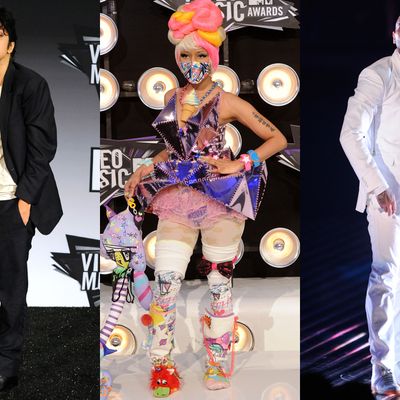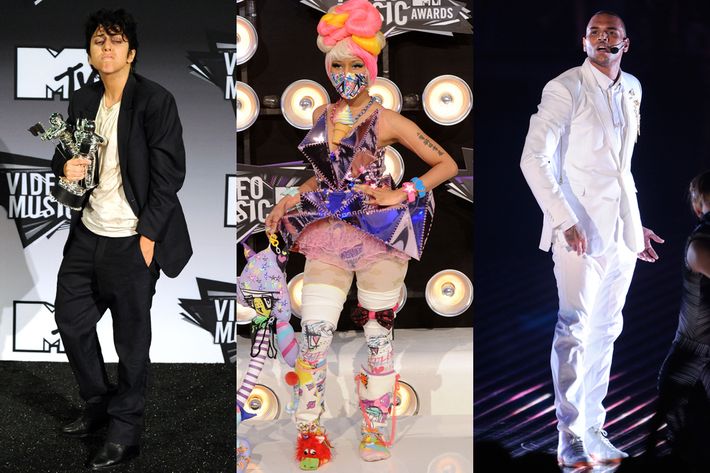

If Sunday night’s MTV Video Music Awards felt, to you, a lot like a high-school talent show or an episode of Glee two things that are admittedly more or less identical — you are neither alone nor mistaken. Unabashed musical-theater nerd Lady Gaga kicked off the show with a third-rate monologue and spent the entirety of the night in character as her male alter ego. Nicki Minaj, a graduate of the high school Fame was based on, wore the kind of outfit you once had to specially unlock in nineties Japanese-import video games about dancing. Two different performances a tribute to Britney Spears, and what I assume was a tribute to Chris Brown’s innovative combination of terrific dancing and total loathsomeness were just elaborate, costumed stage routines set to flaccid musical medleys. The Britney tribute involved dancers reenacting iconic bits of Britney videos, which some of them surely grew up doing in front of bedroom mirrors: This is the same vision of pop-as–dress-up that Glee thrives on. I can’t much speak on the Brown routine, which I watched, like a horror movie, through splayed fingers, but it involved Wu-Tang, “Smells Like Teen Spirit,” trampolines, and wire rigging.
Even the one rock band that played, a middle-of-the-road California group called Young the Giant, was set up in one corner with a pit of specially imported fans and filmed with some odd imitation of rock-club intimacy, so that the whole thing scanned as some kind of stage reenactment of rock. Young the Giant are the kind of band that seems to have been based on someone reading a book about indie rock but not really liking the music involved, and their segment was shot as if someone made a bad movie about that band, and then the movie was made into a musical, and then a high school somewhere coaxed some guitar players to join the drama club so they could produce it. This was before we reached the tribute to Amy Winehouse, which had Bruno Mars looking quite literally like he was starring in a jukebox musical about the late singer.
I mention this not to complain about the VMAs, which are hardly worth complaining about. The thing that might be worrisome is larger than that. Pop music used to be a great excuse for a little comic-book theater, whereas now, increasingly, we’re seeing an odd reversal of that: The theater is an excuse for a little music.
You can’t entirely fault the artists, or even MTV, for this arrangement. It’s remarked, annually, that MTV doesn’t play enough music videos to give out awards for them; at some point, commerce being what it is, Music Television became Teen-Demographic Reality Television, and that was that. Music itself is no longer a very effective way of capturing the imagination of a lot of people at the same time. Teen-Demographic Reality Television, however, is. And this is what you see when you watch something like these VMAs: Music made contiguous with the style of reality TV, celebrity, and tabloid culture, performers of songs all looking strangely secondary to the performers of Jersey Shore, who were revealed during this awards show not to be able to read the word “bass” despite spending most of their time in clubs. Beyoncé can sing well, and Jay-Z can rap well, two skills that are fairly rare — but they got attention at these VMAs mostly for the feat of Beyoncé getting pregnant, something totally ordinary teenagers already do, on MTV’s Teen Mom, all the time.
Here’s the thing, though, about reality and celebrity culture: They’re pretty much devoid of wit. This is by design; it’s a feature, not a bug. It’s all built to allow us to be witty. All the humor and sublime ridiculousness of watching, say, Real Housewives comes in the commentary we pile on it and the jokes we’re set up to make from it, whether on the couch or online. This is a huge part of culture that has basically outsourced the work of being clever or meaningful onto the audience. Something similar goes on with reality competitions (Idol), and even with Glee, which seems entirely built around the idea of dressing up in pop music, reveling in stagey imitation and bedroom-mirror theatrics. (I can’t think of anything better suited to the earnest, overachieving contingent of Gen Y.) And at some point while watching this year’s VMAs, in between laughing at other people’s Twitter jokes, it began to look like this was what we have now instead of a pop mainstream — just people walking through an entryway that looked like a Georgia O’Keefe painting and smiling their way through fun theatrics for the audience to pick apart later. Apparently everyone’s smart and savvy enough to have abandoned the idea that anyone could perform a piece of music, on television, that brought its own content with it, and surprised anyone, or motivated them, or freaked them out.
The funny thing is that I like pop music, I like theater, and I like the great and colorful comic-book pageant that sometimes results when they collide. Sunday night’s Video Music Awards, though, were something different — not theatrics as a way of communicating some new vision of pop, but the reduction of pop to playfully dressing up in other people’s visions. It was less like a collision or symbiosis between theater and music, and more like a warning: The dress-up and drama could swallow that balance whole. To the point where pop stars, instead of inventing styles and aesthetics and bravely showing them to the world on TV, are just putting strange things on their heads and doing the kind of variety-show theatrics that audiences have to build back together into something meaningful.
Related: VMA Wrap-up
VMA Red Carpet Looks




